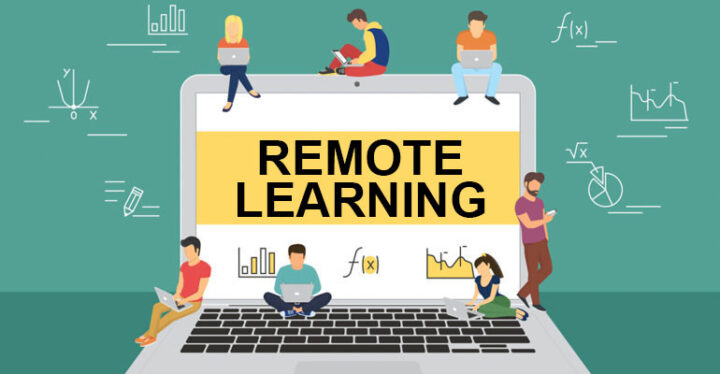Strengths and Weaknesses of Online Learning

When the pandemic escalated and the first lockdown emerged, people could hardly believe it would last long. Everything terminated, including restaurants, ski resorts, government, and, most importantly, educational institutions. Remote learning and working became a necessity for most countries.
However, while remote working was a bit familiar for many people, remote learning was an utterly novel implementation. The quality of online studying varies from one country to another. And it is hard to say whether remote education has become better and more efficient than a traditional one. But be that as it may, it’s been almost a year since students switched to learning-from-home. And now, students have their stance regarding such a solution. So what are the pros and cons of online learning? Let’s find out.
Weaknesses of Remote Learning

With hectic schedules and loads of classes, students claim online education more challenging. Opponents of traditional learning declare that there are the four most substantial disadvantages of learning from home.
Increase in Assignments
The day the world switched to a remote mode, schools, colleges, and universities didn’t realize that it would last long. Thus, the initial approach to online classes was insufficient and unserious. But after some turbulence, academic institutions kicked off with assigning too many tasks for individual work. Consequently, this created a rapid demand for writing services, such as WiseEssays, where students could get first-rate research and writing help.
What is more, it comes as no surprise that this wrong approach often results in students’ lack of time. Many students state that although they are at home, which, purportedly, should be their advantage, they can’t deal with classes. Not to mention the overwhelming number of assignments they get at the end of the day.
Lack of Hardware
For starters, not every household has over one PC. Active online studying strongly relies on solid hardware. This makes the average list of necessary things to attend the class pricey. Many households can’t afford to buy several laptops and hardware to participate in classes and have a stable Internet connection.
Depending on the country, it is obligatory to have the camera on during class. And let’s take families that have more than one child-student. It becomes apparent that financial question is the top priority for such households. Unfortunately, the government hadn’t worked out such a scenario and didn’t facilitate low-income families’ learning.
Quality of Education

Online education couldn’t keep following the same patterns traditional learning used to. It had to have a complex solution that would allow students to study at home and gain qualified knowledge and practical abilities. Sadly, it fell short. The majority of educators followed the same path and didn’t change their syllabi that are now not nearly as efficient as in the past.
Slow Internet and occasional troubles and delays make the learning process more complicated. Professors still haven’t figured out what to do in such cases. As a result, the overall quality struggles, which affects students and their approach to remote learning.
Lack of Social Interactions

Humans must communicate to adjust to the social world and its rules and principles. Students haven’t interacted with one another since the coronavirus spiked a year ago. New features that various tools provide aren’t sufficient to get the true nature of genuine communication. Breakout rooms will never replace live conversations. Neither will video interactions.
Students claim that lack of social communication, especially those with peers and colleagues, makes them feel inadequate. More importantly, they don’t feel such learning techniques will teach them something. According to them, not only do they struggle to work online with schoolmates, but they are also disoriented, which makes it hard to focus on class activities.
Strengths of Online Learning
On the other end of the stick, online learning seems to be impressively good and effective. Those who find remote education beneficial admit: online studying, as an option, should have been introduced to students way before the pandemic outbreak. It is advantageous and provides astounding learning effects. Students highlight the next four pivotal advantages of online education.
Experimental Approach Also Means Satisfaction
Despite teachers’ reluctance to change the plan, a small number of instructors decided to act. And it turned out to be a good call, as such changes have altered the entire perception of online learning. This is the moment when less means more. Students started to be more engaged during classes, and their home assignments are not so burdensome. Many confess that it was the driving factor for their admiration of remote education.
It Often Gives A Plenty of Free Time
Students declare that they now have much more free time as a result of switching to online learning. They handle their daily tasks unrelated to academia, do sports, and even have some leisure time. Besides, people continue to work, and students are not an exception. Thanks to such changes, students kept their positions and can work without rushing to complete myriads of assignments.
Many live in suburbs or rural areas, and they spent a decent amount of time getting to the institution. As a consequence of online education, they don’t have to spend hours attending classes. Nor do they have to get up before dusk to get ready for the school day. For some, the latter is the main benefit of online learning.
Options to Learn from Anywhere
Although people can’t still travel around the globe, there are almost no internal borders. Wherever people live, they can set off a trip at any time of the day and explore their motherland without any hassle. Fortunately, online education allows students to attend classes from any spot, so it is a remarkable benefit for those who have always wanted to embark on a journey at any season.
Also, online education can be way cheaper than traditional. Students don’t need to move to dorms or rent apartments to attend their online classes. Indeed, living with parents may well be a real pain in the neck. However, it pays off, at least in terms of finances. Additionally, online education might be a great way to pay a visit to relatives. Coupled with the perk above, it jazzes up your studies, making it functional and fun.
It Eradicates Any Discriminating Factors

Finally, online learning does away with intolerance. In the online environment, learners are more anonymous and way less exposed to the public. Whatever students use—be it Microsoft Teams, Zoom, or Google Meet—there is no age, racial, ethnic, gender, or any other discrimination. There are no spiteful or envious rumors and disturbing chatters; everyone must focus on the teacher’s presentation or speech and be ready to discuss it afterward and provide meaningful thoughts.
A chance to learn new things online
One more benefit worth mentioning of online learning is definitely the chance to learn new things from the comfort of your home. Now is the perfect moment to start learning the thing you always desired. For instance, if you want to learn how to play guitar, you can find various online teachers to help you achieve that without the requirement to leave your home. Just like that, from the comfort of your home, you can start learning a new language you always find interesting. The only thing you need to do is to find experienced and credible Language Trainers and schedule your classes when that works for you. Despite this, you can start learning how to cook online, or how to make something creative by yourself. As you see, everything that you wish to learn is now available to you, so use this opportunity and embrace yourself!
The Bottom Line
Online education has been present in students’ lives for almost a year. It was hard to assess whether it was good or bad at the very beginning. But slowly, students began to blend in such an environment. As for now, they have a clear position regarding remote learning and its effects. The mentioned list sheds light on what, according to students, is the biggest downside and weakness of online learning and what is a game-changer and a complete strength.
